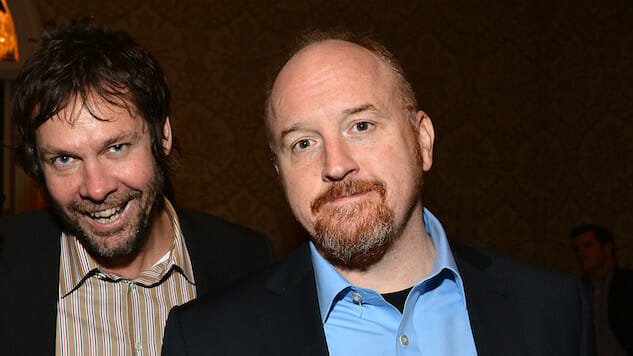Dave Becky Cannot Get a Pass
Images via Getty
Why does Dave Becky still have his job?
If we grant the most generous interpretation of events, the one described in the 3 Arts partner’s public statement last month, here is what happened. Sometime after Louis C.K. forced comedians Dana Min Goodman and Julie Wolov to watch him masturbate in a hotel room in 2002, Becky learned of the incident “third-hand.” He believed it to be a consensual act of infidelity. To save his client from the embarrassment of its public revelation, he sought “discretion” by asking that Goodman and Wolov remain silent about the incident. He apparently sought no further detail on the incident from his client, C.K., or Goodman and Wolov. It may or may not have occurred to him that seeking their silence would effectively bulldoze their careers, compelling them to steer clear of 3 Arts’ vast empire of projects. Probably it didn’t; probably he gave no shit; but we’re being generous here, and he didn’t characterize his response in his apology. In any case, he took what he thought was a reasonable step to protect his client’s dignity.
That was in or around 2002. In the following 15 years, if we take his statement at face value, Becky never once heard of the other incidents addressed in the New York Times report, even as everyone else in the industry somehow became aware that C.K. is a man with a history. Becky did not hear, for instance, that C.K. asked Rebecca Corry if he could masturbate in front of her during the production of her pilot in 2005. That pilot’s executive producers, Courtney Cox and David Arquette, did learn of this incident. They discussed whether to halt production of the pilot, a decision that in other instances might conceivably loop in a star’s representatives, but in this case, evidently, never reached Becky. Nor did the incident come up between him and the Arquettes in the following 12 years. Nor did he ever hear of the Chris Rock Show writer whom C.K. harassed in the ‘90s. These are three incidents of four described in the Times story, though they are probably not the only incidents in C.K.’s past. When he called Corry in 2015 to attempt an apology, he confused her with someone else, someone whom he had shoved in a bathroom. There are more stories than the ones we know of, and if we take Becky at his word, he never knew of them either.
But we shouldn’t take him at his word. His word doesn’t add up. He writes that he heard of the Goodman/Wolov story “third-hand,” and that he “misperceived” his source’s “casual way” of portraying the story. The Times reports that Lee Kernis, one of Goodman and Wolov’s managers in 2002, told Becky directly—that is, secondhand—that C.K. had acted in an offensive manner. It’s unclear how a casual portrayal might distract from the literal characterization of his conduct. Later in Becky’s statement, he says he never heard of the other incidents because he was in a bubble of power: “I have come to realize my status wielded an atmosphere where such news did not reach me, or worse yet, that it seemed such news did not matter to me.” This beggars belief. He already admitted that such news reached him. He even admitted, erroneously or not, that it reached him from someone with no direct knowledge of the incident. If that story reached him, then it’s hardly a stretch to believe others might have. This is an assumption, true, but it’s a safe assumption, just as it’s a safe assumption that C.K. has harassed or assaulted more people than have yet been reported.
-

-

-

-

-

-

-

-

-

-

-

-

-

-

-

-

-

-

-

-

-

-

-

-

-

-

-

-

-

-

-

-

-

-

-

-

-

-

-

-








































